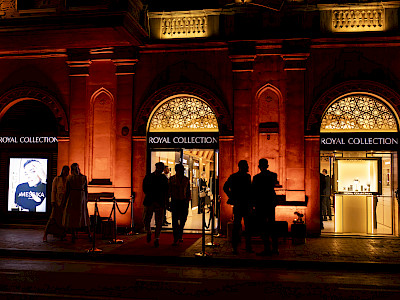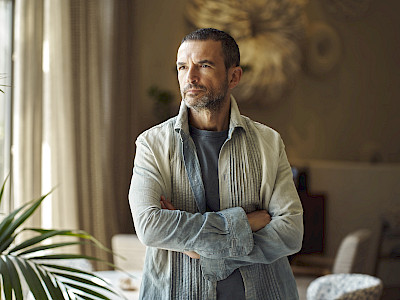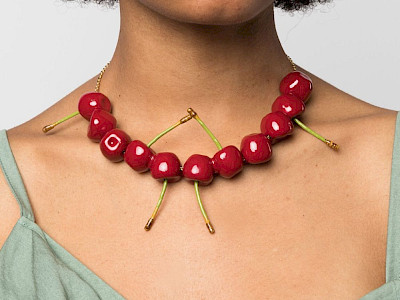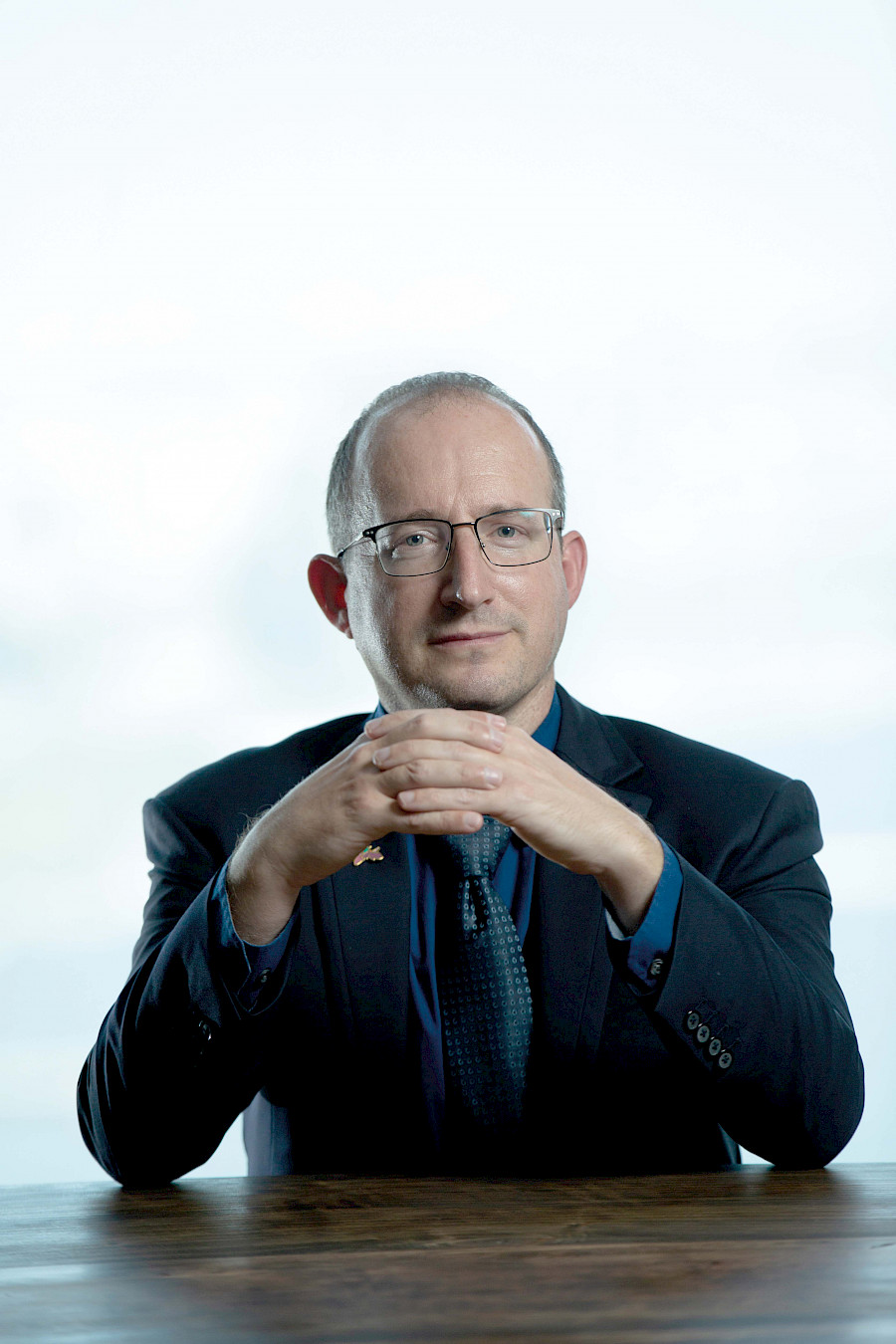
CEO of the Misgav-Ladach Hospital in Jerusalem , a military doctor, ophthalmic surgeon Yishay Falick has been returning full vision to his patients for many years so that they can see the world with all details and colors. Dr. Falick led the humanitarian delegation of Israeli ophthalmologists who visited Baku in March of this year and helped more than 150 veterans of the second Karabakh war, who received serious vision injuries. This charity event took place at the initiative of the YAŞAT Foundation, with the organizational support of the Israeli Embassy in Baku and the The National Ophthalmology Center named after the Academician Zarifa Aliyeva. In April, Yishai Falick's scheduled visit to Baku took place – he conducted an examination of the operated patients.
Israeli ophthalmologists have done tremendous work, returning vision to many of our young veterans. The entire Azerbaijani people is very grateful for this gesture of goodwill. This time you came here alone...
This is my second visit to Baku as part of a humanitarian mission. Our first delegation included eight doctors, specialists in various fields: six ophthalmologists, a neurologist and an administrator. We were building a team from all over Israel... Among them were: Dr. Joav Vardizer, specialist in cataract surgery and corneal transplantation; Dr. Schmuel Levartowski, oculoplasty surgeon; former head of the ophthalmology ward of Barzilai Hospital, Dr. Galina Sholohov; Head-doctor of Ophthalmology ward of Barzilai, Yoreh Barak; Head of Retinal Department, Head of Clinical Research at Rambam Hospital, Dr. Oved Daniel; specialist in the treatment of headaches and cervical spine pains, coordinator of the research department of the Barzilai Medical Center Ira Konon, also the administrative head of the delegation. The second trip to Baku was planned: I conducted a follow-up consultation of operated patients. The National Ophthalmology Center named after the Academician Zarifa Aliyeva, headed by director Elmar Gasimov, created all the conditions for work. There are good doctors and all the necessary equipment for surgeries.
During the first visit, we examined and operated on more than 150 soldiers. Most surgeries were on restoration of the soft tissues of the face, while it was no longer possible to return vision. I've been performing sight recovery surgeries. I remember doing the surgery to one guy named Arif, he studied graphic design and was very detail oriented. I would call him the face of this mission. His eye was seriously damaged, he could only distinguish the light and darkness. But, luckily, the ultrasound showed that the inner shell of the eyeball was alive. I performed an eye reconstruction surgery, removed a cataract and transplanted a cornea brought from Israel. Now Arif can read and even drive a car! My second surgery involved a severe eye burn. After removing the scar, I transplanted stem cells from the patient's healthy eye, as well as the donor cornea. Most likely, a third operation will be needed – to remove traumatic cataracts, after which injections of antiangiogenic drugs will be necessary. After that, maybe I'll make another corneal transplant. Everything will depend on the quality of the retina.
Will donor corneas stay with them for the rest of the life?
It all depends on the body. I brought with me medication that regulates the immune system and prevents rejection.
Which surgery you conducted in Baku was the most difficult?
The most difficult surgery we performed with Dr. Yoreh Barak: Dr. Barak performed surgery on the retina, and I did a silicone cornea transplant. Unfortunately, the patient's retina was in poor condition... But we did everything in our power.
How long did this transplant surgery last?
About three hours. Another complex operation lasted about five hours. In addition, we performed an operation to transplant stem cells from the amniotic membrane – the inner fetal membrane, it took about four and a half hours. We left the O.R. at 22:30 that day...
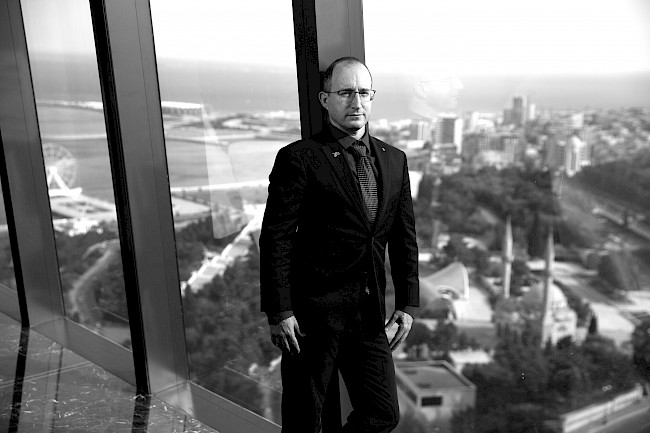
Did you bring special equipment from Israel?
We brought cornea, stem cells, prostheses and some medical equipment. To a large extent, Zarifa Aliyeva Medical Center has all the necessary equipment for conducting operations, and most importantly, specialists. This time I brought 24 eye prostheses with me. Four of them are unique – they are made manually for patients who could not wear standard prostheses. After all, we not only returned vision, but also engaged in oculoplastic surgery so that these young people can feel confident in society.
Does this mean, that there is no need to send Azerbaijani soldiers for treatment to Israel?
Now there is no such need. We thought some of them might need bone reconstruction. In this case, we do a 3D printing of a quarter or half of the face. But there were no such patients. Mostly we worked with fragmentation injuries. We could send the wounded to Israel, but this is not necessary, rehabilitation goes normally.
You do not only run a medical center, but also serve in the army?
I'm the commander of the airborne intensive care unit. Soldiers with completely various injuries come to us – mostly these are bullet wounds, and our main task is to save their lives. Of course, we cannot carry out complex operations on the front line: we provide first aid and send the wounded to the hospital. I served in the army before becoming a doctor. And now, every year like every Israeli, I undergo military training for a month.
Why did you choose ophthalmology as your specialty?
My father went blind because of glaucoma, so my choice of profession is understandable. Today I also serve as Director of the Standards and Rules Department at the Ministry of Health of Israel. It is my responsibility to decide whether the patient sees: if ophthalmologists cannot determine this, they submit an application, and I make a final decision.
Do you plan to continue cooperation with ophthalmologists of our country?
Now we are cooperating with the Zarifa Aliyeva Center, and I want to propose the creation of a joint enterprise for the production of prostheses. One of this center's specialists, Dr. Gunay, will come to our hospital for a half-year internship. The surgeries we conducted in Baku also served as training. I go to study at the best clinics of the world to improve my qualifications. We also plan to develop relations within the framework of information technologies. In Israel, IT has received a very good development in the field of healthcare, we plan to help Azerbaijan develop IT in this area. I am sure that this will contribute to improving the health of the entire population of your country.
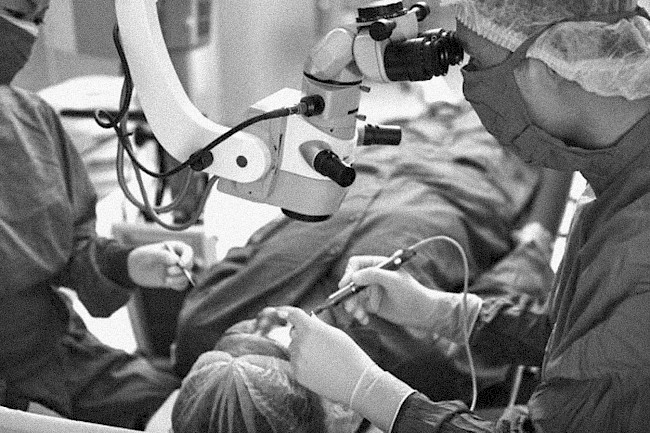
What are information technologies good for in medicine?
Information technologies change everything! Israel has introduced a very strong program that contains all the medical records of patients. For example, a person had a car accident in the north of the country, where is no neurosurgeon nearby. He goes through a CT scan, all information is immediately transmitted to the center, neurosurgeons look at the data and make a decision. And when the patient gets to the right doctor, he no longer needs to get a new CT scan. Moreover, the system stores all the information about the patient: state of health, medication he takes, former diseases. So the doctor does not work blind, and that is very, very important. Even now, during vaccination, IT allows us to monitor every vaccine, because they have a shelf life. I think that IT will develop rapidly in Azerbaijan, we have partners in Israel with very strong IT capabilities.
How long has Israel been using information technology in health care?
We've been using electronic medical records for at least the last 20 years.
Your country is famous for its high level of health care. What is the secret to this prosperity of medicine in Israel?
First of all, it’s the atmosphere itself. We have a very, very competitive environment. Only the best of the best can study medicine in Israel. Really strong professors teach at medical universities. There are two Nobel Prize-winning professors at my university. So we learn from the best of the bests. Then we go through a very difficult residency. If in the United States it takes three years, then in Israel – all five. At the same time, we work. Then we go through a specialization, and only after that we can really work well. In addition, we have developed cooperation – doctors always help each other. For example, I am in a WhatsApp group of 30 doctors, and we consult each other about complex cases. We constantly learn, assist each other, create innovative technologies. My wife, an oncologist, is not only the best doctor in the country, but also one of the best scientists in the world. She has a lab, graduate students. She has a PhD in epigenetics, is engaged in research and development in the field of regenerative medicine, heads the MBA program in the field of bioinnovations. Using her example, we see how a scientist works in Israel. We have programs for advanced training of doctors, we always try to introduce innovations, invent not only medical equipment, but also medical supplies, and new medical concepts. So the level of medicine in Israel is directly affected by such an environment of constant learning.
In our time it is strange to hear that, despite the high competitiveness, someone helps someone...
We're very open. We, like the Azerbaijani people, are very helpful. This is a competition not against each other, we try to be the best versions of ourselves. Our country has developed a culture of mutual support. Together we hold collective discussions, together we create startups. We work as one. Our people are very kind, they think not only about themselves. I will give an example: recently over thousand people came to our hospital for vaccination. It was 22:00, and we still had vaccines left, and their validity expired. I asked who could stay with me. Everyone were tired, some of the workers were elderly. However, with the exception of one nurse who was supposed to feed the baby, no one left until we finished the vaccination. We work very hard and try to work well. And patients appreciate it. Many doctors give their phone numbers to patients so that they can ask questions directly. I work in many clinics in Israel, and at the same time I manage a hospital at least five days a week. But when my patients have serious health problems, they don't call my secretary, they call directly me. This communication lasts 24 hours a day, seven days a week. Doctors in Israel are inseparable from society. I think that's the secret. When you feel responsible, you get better. My wife needs to be the best of the best in the world, because her patients are terminally ill people, and she can't just give them a very good medicine - she should give them the best medicine. We compete all the time to be the best for patients.
How many years do you need to study in Israel to become a good doctor?
Six years of studying, one year of fellowship, four to six years of residency and from one to two years of internship. Some doctors, like my wife, are defending their PhD and finishing their MBA program, it's another six years. I think after 20 years of training, you can become a good doctor. If you want to be a professional, 20 years is not so much.
The medicine certainly does not stand still thanks to such doctors. What do you think should be expected in medicine in the near future?
I believe that in the coming decade there will be many technologies that can be attributed to science fiction today. An implant has already been created in Israel, which is injected into a person who has lost an eye. If the retina and optic nerve function, then these people are able to see again. In the future, we will implant cameras in the brain, and blind people will be able to receive information, as if through the eye, directly into the brain. Such a chip is not suitable for everyone yet, but in 10-15 years it will become possible, and the blind people will be able to see again. We live in a wonderful time!
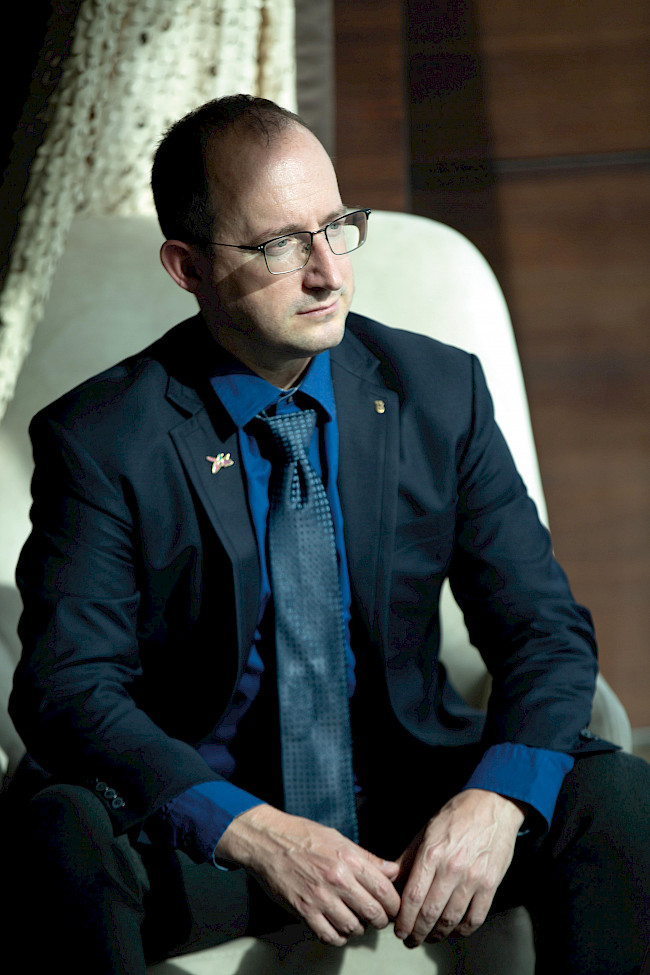
Do you yourself participate in the development of such technologies?
My colleague and I are now working on equipment that will be used in the treatment of advanced myopia. It affects 100 to 200 million people in the world, but currently there is no other treatment. In Israel, they develop chips that return vision, treat glaucoma with a laser. Israel is one of the leading countries in the creation of new technologies in ophthalmology.
You help your patients all 24 hours a day. Yet every day people in the world lose their sight. If you had one minute to address to all the people of the world, what would you advise them as an ophthalmologist?
First of all, wear good sunglasses. Follow the correct diet, which contains riboflavin, as well as vitamins that protect the eyes. After 40 years, go for regular examinations, measure intraocular pressure to avoid glaucoma, this silent sight thief. People check the health of their cars every year, but do not turn to doctors to check their bodies.
Why do you think people are afraid to go to doctors?
They're not afraid, they just don't want to waste time on regular check-ups. They don't think their bodies are like a car that needs to be checked regularly. We all need regular check-ups with a therapist. Today there is a lot of preventive medicine in the world. Those who go to regular checkups get better information about what they should do with their health. Women die of breast cancer because they don't get tested on time. As in Azerbaijan, we have compulsory state health insurance – everybody is insured, examinations are free. Regular examinations are carried out in my hospital, we have very good tomosynthesis devices. We often detect signs of breast cancer in the initial stages, when it can still be cured, and this saves lives. Women should have a regular mammogram. Everyone who does not undergo a colonoscopy also risks their lives. People think their bodies are always 25 years old, but they're not. It is necessary to visit an ophthalmologist regularly – this can help prevent blindness, especially for people with diabetes who do not always undergo an examination, and the doctor discovers them already in a very difficult situation that could be prevented. People need to monitor their health, consult with a therapist about blood pressure. Medicine really does not stand still, it constantly develops and can help with many diseases.
How do you rest from work?
The main meaning of our lives are children. We have three of them, and we constantly travel the world with the whole family. I love extreme: in the army, extremely difficult cases in the operating room and in life. I like snowboarding, I have a downhill bike. I do scuba diving, I was on the Galapagos and other exotic islands, in Venezuela, I plan to swim in the Seychelles region. Life is interesting on its own! Even when you are the CEO and you just work, you communicate with people – with patients, employees. I think this is the actual life!

